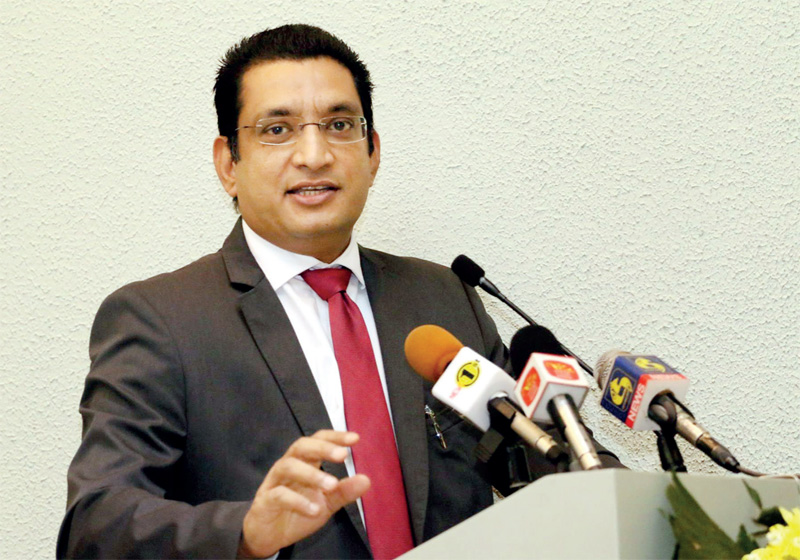Monday Feb 16, 2026
Monday Feb 16, 2026
Friday, 9 July 2021 00:00 - - {{hitsCtrl.values.hits}}

The Muslim Minister of Justice has a delicate but epochal task in his hands
 The Muslim Marriage and Divorce Act (MMDA) is once stirring the All Ceylon Jamiyyathul Ulema (ACJU), which is a Men Only Mullah Organisation (MOMO). In between the MMDA of colonial origins and a MOMO of religious conservatives is an unelected Muslim Minister of Justice, who is a professional lawyer and part of a political party elected to power to implement what a monkish parliamentarian called One-Country-One-Law (OCOL) during the previous regime.
The Muslim Marriage and Divorce Act (MMDA) is once stirring the All Ceylon Jamiyyathul Ulema (ACJU), which is a Men Only Mullah Organisation (MOMO). In between the MMDA of colonial origins and a MOMO of religious conservatives is an unelected Muslim Minister of Justice, who is a professional lawyer and part of a political party elected to power to implement what a monkish parliamentarian called One-Country-One-Law (OCOL) during the previous regime.
MMDA, since it was legislated in 1951, has no doubt undergone some changes. However, it has remained fundamentally gender biased in favour of men and continued to be shaped not by the spirit of Islam but rather by the rules of fiqh, which is customarily dubbed as shariah in order to stamp those rules with divine seal. Like many aspects of Islamic jurisprudence, guidance regarding marriage, divorce, and child maintenance needs to be contextualised and it is the changed context of today that has made reforms to MMDA, vital and unavoidable.
The most important change in the current context is in the status of Muslim women. When MMDA was introduced in 1951, it was meant for a Muslim community in which women were deemed to be queens in kitchens and bedrooms, but considered worthless outside those precincts. In fact, family rules and customs in majority of Muslim countries developed under that rule. This is not true today.
Muslim women are at least as productive as Muslim men, if not more, intellectually, professionally, entrepreneurially, educationally, and are also involved politically and in pioneering social changes in countries where they live. In Sri Lanka too, thousands of Muslim women have become the chief breadwinner in their families and accordingly men have become dependents. There has been a radical change in the role and status of Muslim women, especially over the last 40 to 50 years, thanks to the spread of secular education among them.
Given that fundamental transformation, it was chiefly due to the women’s tireless agitation to get legally recognised as equal partners in all matters relating to matrimony that prompted the appointment of an expert committee, chaired by Chief Justice Saleem Marsoof (JSM), in July 2009, by the then Minister of Justice Milinda Moragoda. The committee also included a few eminent Muslim women.
After a laborious 10 years of deliberation and inquiry JSM submitted its recommendations, which included a number of progressive changes to MMDA, to the Yahapalana Government in 2019. The Government at the time of submission was in its dying days before facing a General Election.
ACJU/MOMO was immediately up in arms against some of those recommendations, especially regarding Quazi courts and polygamous marriages. In this protest, Muslim parliamentarians were coaxed with threats of losing their electoral support, and they therefore, dragged their feet and blocked JSM recommendations legislated.
It was an opportunity missed because of ACJU’s sabotage with the connivance of Muslim parliamentarians. However, in that environment of delay and uncertainty, a monkish member of Legislature, Athuraliye Rathana Thera, proposed a Private Bill calling for the removal altogether of MMDA, and argued for OCOL. ACJU/MOMO won the day of course, but without realising what was to come with the change of government.
The Rajapaksa regime came to power on the promise of implementing OCOL. It has an appointed Muslim Minister of Justice in the Cabinet, who admittedly does not have the same aura and influence of a previous Muslim Minister, Badiuddin Mahmud, who was also an unelected member in the Cabinet of the SLFP regime in the 1970s, but who was able carry through several controversial measures in the field of education, which proved to be beneficial to his community, amidst stiff opposition from the Cabinet. The new Minister is caught between the Viyath Maga advocates of OCOL and agitators from ACJU/MOMO.
The Cabinet appears to have approved proposals to raise marriageable age to 18 and to allow brides to sign the marriage registration document as proof of their consent. However, on the abolition of Quazi courts and polygamy no decisions have yet been made. In the meantime, ACJU/MOMO is agitating with its usual threnody against radical changes in both.
OCOL advocates would demand Quazi courts be abolished altogether. That will have international repercussions at a time when the regime is already taken to task for its human rights violations and ethnic and religious repression of minorities. Abolition of Quazi courts tantamount to doing away with MMDA completely. If the Rajapaksa regime is going to leave other legal systems such as Thesavalamai and Kandyan Laws untouched while abolishing only MMDA, Muslims will have the right to take their complaint of religious discrimination to international courts of justice.
Similarly, the abolition of polygamy altogether requires a rational approach. Almost all societies that did away with polygamy are faced with the evil of producing concubines and mistresses. Let the Muslim minister decide which one he prefers. Rationally speaking, the final say on polygamy should be left to the women. After all, marriage in Islam is basically a civil institution although strongly recommended in the Holy Text.
No marriage should be allowed without consent of both parties, “and any woman who does not wish to enter into polygamous marriage has the right to refuse. Islamic law goes even further than that and grants the wife the right to incorporate her refusal of polygamy in the marriage contract.” (Shaykh Muhammad al-Ghazali, ‘A Thematic Commentary on the Qur’an,’ The International Institute of Islamic Thought, Herndon VA, USA, 2000, p. 57).
The Muslim Minister of Justice has a delicate but epochal task in his hands. On the one hand within his own community women are crying for justice and equality in matters of matrimony. On the other, conservative quarters want to maintain their domineering position in such matters. Above all, there are the OCOL elements within his Government who wants MMDA to be rooted out. Will he come out of this test a hero or villain?
(The writer is attached to the School of Business & Governance, Murdoch University, Western Australia.)